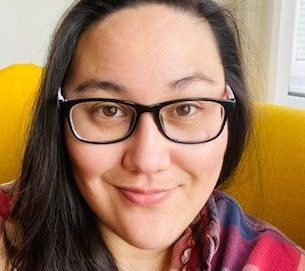Researcher of the Month: Megan Fourqurean

Please introduce yourself and tell us a little about your ‘research journey’. How did you get to where you are right now?
I’m a third-year postgraduate researcher in the School of English and I’m working on contemporary Nigerian fiction. My research journey started in my undergraduate university when I developed an interest in postcolonial feminist literature. I had an incredibly inspiring and influential professor, Dr. Nalini Iyer, who introduced me to female authors from around the world, particularly Africa, India and the Caribbean. I found these texts incredibly engaging and deeply insightful, and they changed my perspective on the world. From that point forward, I’ve worked primarily with texts that are considered postcolonial across both my MA and currently in my PhD.
Who, or what, sparked your interest to work on your particular research area?
My research area lies primarily at the intersection of gender and sexuality, religion, and environmental criticism within literature. I think my interest in feminism was the natural starting point for my work in gender and sexuality, which has since expanded to include queer theory more widely. I’ve also always had a general interest in religion, but I didn’t begin researching it seriously until I read Akwaeke Emezi’s debut novel Freshwater and realised how deeply Igbo religion runs throughout the text. The novel is so complex that I found myself researching it just so that I could begin to understand what Emezi was saying. I’m still researching that novel now, and I’ve only scratched the surface! Finally, I began working in ecocriticism thanks to Professor Graham Huggan, whose Postcolonial Ecocriticism MA module introduced me to the field as a whole.
What are you currently working on, and why do you think it’s important?
Currently I’m working on my doctoral thesis, which examines the role of indigenous religion in the way we think of gender identity. I use novels by contemporary Nigerian authors as a way of exploring how queer, nonbinary, and transgender individuals can use religion and spirituality to explore who they are. The particular religion that I deal with centres around the water goddess Mami Wata, who originates in Africa but appears in religions around the world. I think doing this kind of work is important because we need to recognise that people see and experience the world differently based partly on where they come from and where they live. Here in the UK and other wealthy Western nations, we assume that our experiences and perspectives are universal. What we sometimes forget is that our ways of thinking are a product of our environments just as others are. Working with indigenous religious practices such as Mami Wata worship can help break down the assumption that only one kind of knowledge is valuable.
How does your research contribute to current debates in African (and African diaspora) studies as an interdisciplinary field?
My work spans a broad range of fields, including anthropology, sociology, law, history, medicine, and environmental studies. I think my research contributes to the overall debate about the place of literature in African and diaspora studies. Literature can often appear to stand apart from other more ‘practical’ fields as a result of its creative and time-consuming nature. I hope to counteract those assumptions by using literature to engage with urgent concerns such as gender identity and environmental studies, both of which directly influence our lives and our world today. I also seek to further debates about knowledge production by highlighting and making space for the work being done by African and diasporic academics within African studies. Rather than trying to impose European-oriented understandings of gender identity and the environment, my research supports ideas and practices that originate from the African continent. I hope that my participating in this and other such debates, I use my research to help amplify the voices of past and current African and diasporic researchers and thinkers in the field.
